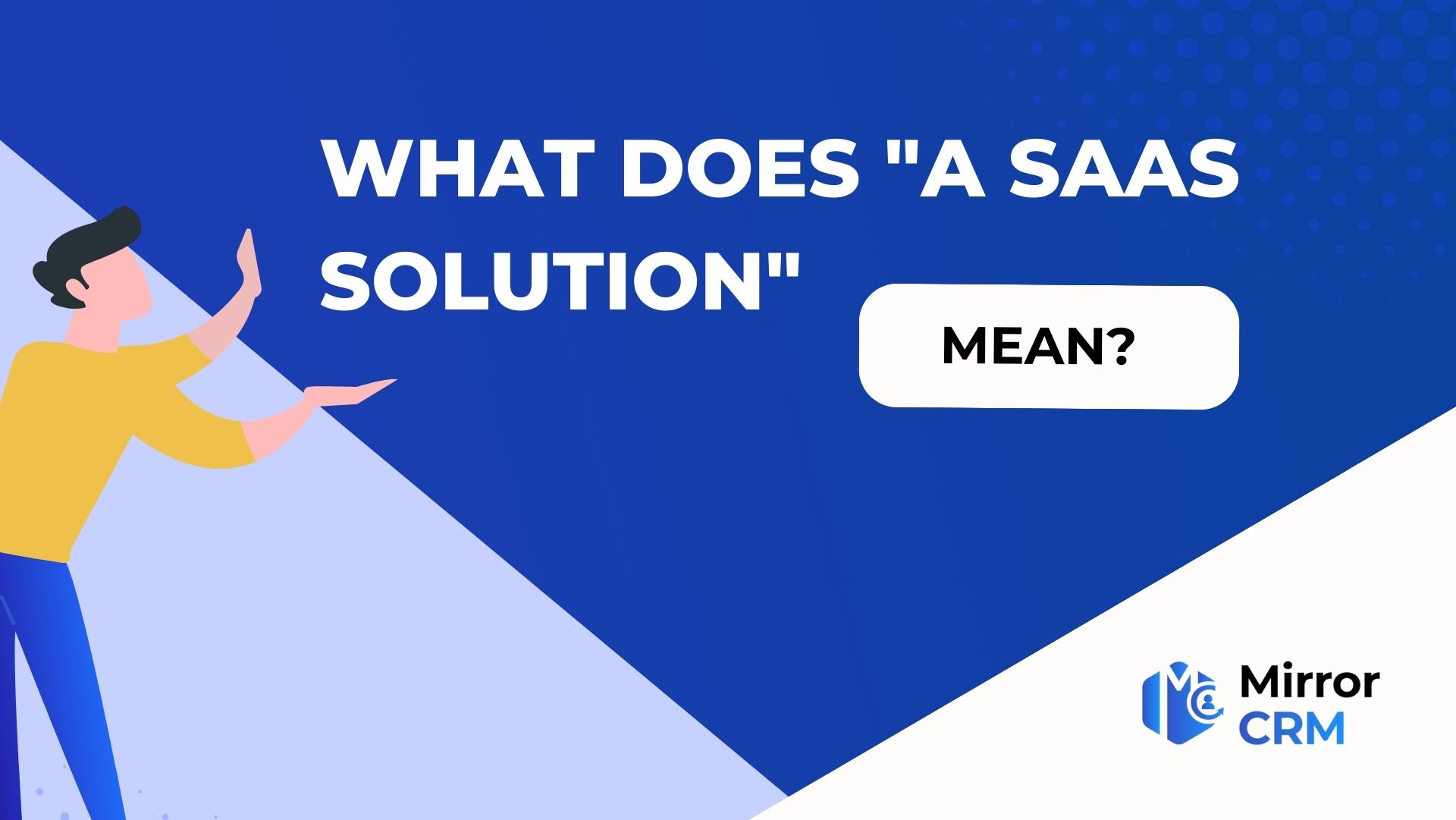SaaS (Software as a Service) solutions have become an essential part of corporate IT management, thanks to their cloud-based delivery mode. This SaaS model eliminates the need for cumbersome on-site installations and maintenance, enabling companies to significantly reduce their infrastructure costs. By adopting SaaS software, companies benefit from continuous, automatic updating, guaranteeing constant access to the latest applications and features without manual intervention. For example, our MirrorProfiles SaaS solution means you don’t need to develop a business unit dedicated to setting up proxies and warming up LinkedIn accounts. In addition to the expertise aspect, it’s also less economical to try to bring everything in-house, because SaaS providers benefit from economies of scale thanks to their multitude of customers and subscription-based services, something that an end-customer company just can’t have.
The flexibility offered by the SaaS model enables a company to adapt rapidly to changing market requirements, while offering the possibility of scaling resources and applications as needed, without the constraints of a physical infrastructure. This cloud-based service model allows businesses to efficiently use their resources and access scalable computing power, enhancing their ability to respond to evolving business needs.
An additional advantage of SaaS is its facilitation of collaboration across teams and geographies, thanks to real-time data availability and web-based access. Employees can work seamlessly from anywhere by simply logging in via the internet, breaking down the barriers created by location-specific software installations. SaaS applications also integrate well with other cloud-based tools and PaaS platforms, creating a coherent framework for remote and collaborative work. Moreover, SaaS providers ensure data security and provide robust infrastructure management, enabling organizations to effectively use these services across multiple departments.
What is spin selling?
The term “SaaS” stands for “Software as a Service”. This cloud-based approach to software is distinguished by its method of distribution and use: instead of being installed and managed locally on individual computers or corporate servers, the SaaS software applications are hosted in the cloud by third-party providers and accessed via the Internet. This model allows businesses to use scalable and customizable services, enhancing their IT infrastructure management and reducing the need for on-premises hardware.
SaaS solutions offer many advantages for a company, not least in terms of cost reduction, IT complexity, and scalability. Business users don’t have to worry about purchasing, installing, updating, or maintaining the hardware and software infrastructure needed to run the applications. All this is taken care of by the SaaS service provider. As a result, businesses can access up-to-date, highly available applications through a cloud-based platform with less upfront investment and lower operational costs. SaaS services also provide robust data security and resource management, ensuring seamless performance. There are plenty of SaaS solutions available when a company wants to automate its lead generation on LinkedIn or any other acquisition channel. You’ll have to make a choice, but don’t hesitate to contact our SaaS providers: our team is made up of growth hackers and sales automation experts.
What’s more, SaaS solutions are bolstered by integrated security features that often surpass what many small and medium enterprises (SMEs) can afford to implement on their own. These cloud-based security features typically include data encryption, zero-trust architecture, and frequent backup mechanisms, ensuring business continuity. SaaS providers leverage advanced security tools and data protection protocols across their applications, delivering robust security and compliance standards for organizations of all sizes.
The SaaS model also offers remarkable elasticity and adaptability. Companies can easily scale up or down their subscription-based services and resources according to their needs, without having to worry about hardware limitations or licensing constraints. This cloud-based computing model translates into greater operational flexibility and the ability to respond rapidly to market developments or organizational needs. SaaS platforms provided by various vendors ensure that businesses have access to multiple application models to suit their diverse requirements.
It’s worth noting that modern SaaS solutions are evolving rapidly and now often integrate cutting-edge technologies such as machine learning, artificial intelligence, and blockchain to enhance their efficiency, automate workflows, and ensure smarter data utilization. These embedded features within SaaS applications allow software to learn from user behavior and continuously optimize operations. Cloud-based SaaS platforms leverage these technologies to provide advanced tools for data analytics and business management, further increasing the value and capabilities offered to users and organizations.
Why use spin selling in your sales cycle?
The adoption of SaaS solutions offers a series of substantial advantages for businesses of all sizes, from small startups to large enterprises, particularly benefiting small and medium-sized enterprises (SMEs) looking to maximize their resources while remaining competitive. Cloud-based SaaS services provide scalable applications and cost-effective models, enabling businesses to efficiently manage their IT infrastructure and access a wide range of software tools offered by various providers.
Reduced costs: One of the main reasons for choosing a SaaS solution is to significantly reduce IT and infrastructure costs. Initial costs are considerably reduced, as there’s no need to invest in servers, cloud infrastructure, and other costly hardware. What’s more, maintenance and software updating costs are borne by the SaaS provider, enabling companies to convert high fixed costs into more manageable variable subscription costs.
Rapid deployment: SaaS solutions can be deployed very quickly, unlike traditional software applications that require lengthy installation and configuration. This rapid deployment capability allows businesses to quickly adopt new cloud-based services and benefit immediately from new features and enhancements without delay.
Automatic updates: The SaaS provider manages all necessary updates, security patches, and enhancements, ensuring that users always have access to the latest version of the software without any service interruptions or additional costs. This eliminates the need for companies to devote time and resources to system maintenance and application development. For example, our MirrorProfiles customers may not realize it, but 90% of our time is devoted to increasing the robustness and security of our accounts to further reduce the ban rate.
Accessibility and mobility: With a cloud-based SaaS solution, users can access applications, data, and services from any location with an Internet connection. This facilitates working remotely and on multiple devices, increasing workplace flexibility and improving employee productivity. SaaS platforms ensure seamless access and synchronization across all user access points.
Enhanced security: SaaS providers are investing heavily in security to protect their customers’ data, offering security levels that SMBs couldn’t afford independently. Regular data backups, disaster recovery services, advanced encryption protocols, and comprehensive security management are generally included in the SaaS service. This ensures that customer data remains secure and compliant with industry standards.
Scalability: SaaS solutions offer great flexibility in terms of scalability, enabling companies to easily adjust their subscriptions to add or reduce users, features, or storage capacity as their needs change, without having to invest in new infrastructure. This cloud-based scalability allows businesses to swiftly respond to market demands and organizational growth. Thanks to the rental of heated, automation-ready LinkedIn accounts, LinkedIn has become a scalable acquisition channel, which it wasn’t before.
Focus on core business: By delegating IT and software management to an external SaaS provider, companies can concentrate more on their core business activities. This approach frees up valuable resources and reduces the need for in-house infrastructure management, allowing organizations to reallocate their resources to strategic initiatives and business development.
User-friendly onboarding: Many SaaS providers facilitate new user adoption as a seamless process by offering comprehensive documentation, tutorials, and customer success programs. These user-friendly onboarding tools increase adoption rates across the organization, ensuring a quicker return on investment and maximizing the effective use of SaaS applications within businesses.
In conclusion, the use of a cloud-based SaaS solution offers companies a host of practical and economic advantages, enabling them to optimize operations with scalable applications, reduce data security risks, and focus on growth and innovation. SaaS platforms provide flexible services and robust infrastructure management that support business development and strategic initiatives.
How can you incorporate spin selling into your prospecting?
Having explored the benefits and definition of SaaS solutions, it’s interesting to see how these advantages materialize in specific applications, such as MirrorCRM. Designed specifically for sales prospecting, MirrorCRM perfectly embodies the flexibility, efficiency, and scalability that SaaS solutions offer their users. As a cloud-based CRM application, MirrorCRM integrates seamlessly with other SaaS tools and platforms, providing robust data management and security for businesses.
MirrorCRM enables seamless synchronization with all your existing prospecting tools, creating a unified ecosystem that centralizes all relevant data in a single pre-CRM platform. This data aggregation leverages cloud-based services to facilitate a clear, real-time view of your sales pipeline, optimizing decision-making and strategic planning processes. By integrating multiple SaaS applications, MirrorCRM provides a comprehensive solution for managing and analyzing customer data effectively.
By providing an automated to-do list, MirrorCRM transforms the way sales reps manage their day using a cloud-based platform. They can follow up with all their prospects via a single interface, integrating multiple SaaS applications and eliminating repetitive tasks while reducing the risk of error. This time-saving software feature translates directly into an increase in sales velocity, enabling teams to concentrate on value-added actions and strategic business activities.
Automated reporting with MirrorCRM ensures that all sales actions are recorded and analyzed using advanced data analytics tools. This cloud-based application enables continuous evaluation of the effectiveness of prospecting campaigns, leveraging SaaS platforms to adjust strategies according to observed performance metrics. By integrating robust analytics, MirrorCRM helps businesses refine their sales approaches and improve overall marketing effectiveness.
MirrorCRM’s unique approach, focusing exclusively on prospecting and pre-managing customer relationships within a cloud-based SaaS application, clearly distinguishes prospecting activities from inbound and outbound marketing campaigns managed by traditional CRM platforms. This separation avoids confusion and errors that can arise when these functions are mixed together in a single system. By using MirrorCRM for prospecting and a traditional CRM for marketing and communication, companies can optimize their SaaS applications and maximize their campaign results through specialized software tools.
Furthermore, leveraging cutting-edge technologies embedded in SaaS platforms like MirrorCRM, such as predictive analytics, AI-driven personalization, and machine learning models, boosts the efficacy of prospecting efforts. These cloud-based technologies enable smarter lead scoring and enhanced targeting, utilizing data-driven insights to ensure your sales reps engage with the highest-potential leads effectively. By integrating advanced analytics and AI services, MirrorCRM provides powerful tools for optimizing sales strategies and automating key tasks.
In short, MirrorCRM illustrates how a cloud-based SaaS solution specifically designed for commercial needs can transform prospecting processes by offering an integrated, automated, and highly secure platform. This SaaS application enables companies to maximize business efficiency through advanced data management and automation tools while reaping the fundamental benefits of SaaS technologies. By leveraging robust infrastructure and secure services, MirrorCRM provides a comprehensive solution that enhances sales operations and drives business growth.
SaaS solutions represent a major step forward for companies looking to modernize their cloud-based IT infrastructures, reduce costs, and increase operational efficiency. These SaaS platforms enable agile application management, automatic updating, and global access, providing a solid foundation for innovation and growth. MirrorCRM, as a pre-CRM SaaS solution specifically designed for prospecting, leverages these benefits by streamlining sales processes, improving the coordination of prospecting data, and increasing productivity through automated tasks and accurate reporting. This illustrates the transformative impact of SaaS solutions, not only in terms of technology management and cloud services but also for the continuous improvement of business operations and strategic development.





